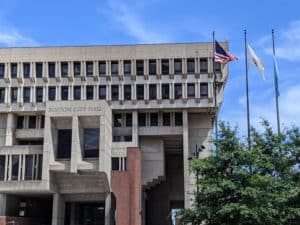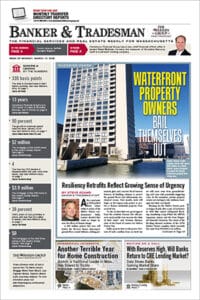Pointing to the doldrums in which housing development has been stuck, industry group NAIOP Massachusetts asked the Wu administration to delay next week’s implementation of higher affordability requirements.
“Unfortunately, the new inclusionary zoning requirements will only worsen the housing crisis and slow housing production,” NAIOP Massachusetts CEO Tamara Small wrote in a letter Friday to the Boston Planning Department and Mayor’s Office of Housing.
In a statement issued Monday, a city spokesperson indicated the new policy is on track to take effect as scheduled Oct. 1.
“We’re working with developers on a case by case basis to understand the obstacles they face to starting construction and we are extending flexibility to support their projects in moving forward,” the statement said without giving specifics.
When the policy change was first proposed, developers and industry groups warned it would add another hurdle to financing projects on top of interest rate and project cost increases.
The Boston Planning & Development Agency board voted to support the new policy in July 2023, but the Boston Zoning Commission voted to delay its effective date until October 2024.
“NAIOP strongly believes that if allowed to take effect on Oct. 1, the regulations will do nothing but further dampen already depressed housing production in the city of Boston,” Small wrote in the Sept. 20 letter.
Difficult financing conditions continue to push off groundbreakings of major multifamily projects.
The housing development downturn isn’t limited to the city of Boston. Across the region, new apartment construction hit a decade-long low this summer, brokerage Colliers reported.
Big apartment landlords such as AvalonBay Communities forecast more rent increases for their Greater Boston properties because of declining housing starts.
In the letter to the Acting Director of Planning Devin Quirk and Chief of Housing Sheila Dillon, NAIOP’s Small wrote that “Boston had already seen a significant slowdown in housing creation for projects that were approved under the lower percentage requirement. Now, the data is even more troubling.”
Approximately 23,000 housing units approved by Boston officials in recent years have yet to break ground, including the 7,150-unit Boston portion of the Suffolk Downs redevelopment. The first building in the Revere portion of that development, the Amaya, recently opened to renters.
The city of Boston’s updated policy requires 17 percent of units to be reserved for households earning a maximum 60 percent of area median income, and another 3 percent for those with housing vouchers and incomes below 30 percent of AMI. Projects also could qualify by reserving 15 percent of units at a maximum of 50 percent AMI, plus the 3 percent voucher component.
For-sale condominium projects would have a 20 percent affordable unit minimum, but be required to reserve half of the units at 80 percent of AMI and half at 100 percent of AMI.
Some local affordable housing developers supported the changes, saying the deeper household income requirements would help alleviate excessive housing burdens and homelessness.
Consultants RKG Assoc., in a report commissioned by the BPDA, predicted that the changes would make condo projects financially infeasible in Dorchester, Hyde Park, Jamaica Plain, Mattapan, Roxbury and West Roxbury.









